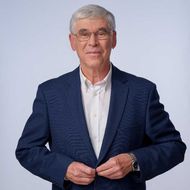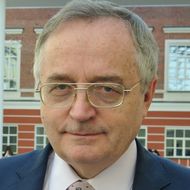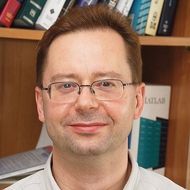Interview with Yulia Chekunaeva, graduate of the ICEF double degree Bachelor’s programme 2003, the winner of "Golden Vyshka " HSE award in the category “professional success of HSE graduate" >>
.jpg)
Interview with Yulia Chekunaeva, graduate of the
ICEF double degree Bachelor’s programme 2003, the winner of "Golden Vyshka " HSE award in the category “professional success of HSE graduate".
- Yulia speaking about the process of learning at ICEF, what was the most memorable? How do you assess your studying experience overall?
A real life case: The first year of my studies the first mid-term exam, which I desperately failed on “Micro-
.jpg)
economics I” (it was not even close to 30%) and I had an interview with Dr. Amos Witzum from LSE of why did I failed, the true answer was because I didn’t have a clue of what is microeconomics is as I joined the university straight to the 2
nd year after transferring from another one and I didn’t have a full year of elementary micro that all other students have. I had a real hard time to understand how to solve one of the 6 assignments in the mock mid-term exam, effectively I solved only one. He was thinking if I’m good enough to stay after 3 months of studies at ICEF (as it was an exceptional case back then) and I said to him “this is the first and the last exam in my entire life that I failed, please allow me to stay if there is another one like that I quit myself”. He didn’t believe me, but then another professor supported
.jpg)
myself (
Dr. Rosie Gosling), I stayed and never failed, don’t ask me how I learnt microeconomics, but somehow it got into my blood and I even got distinctions at further exams.
So the most memorable part is the inability to fail as you cannot re-sit the exam as in any other university in Russia, in ICEF you failed your summer exams your are out.
I think this was a great time of my life full of unique student experiences, this is related to the small group of people we were studying in and great composition of professors, class tutors and administration personnel that made our life so cool and exciting, apart from bringing great knowledge to us. It felt like university home back then and life at home, at friends or at uni all got together and was simply something you cannot replicate even if you wish to.
- What are knowledge and skills that you gained at ICEF that are the most useful in professional activities?
.jpg)
Apart from instrumental for my day-to-day activities knowledge of the corporate finance, banking and math coupled with econometrics, I found the vital importance of the course of sociology which allowed not only to grasp some theoretical knowledge, but also enhanced critical reasoning and asking questions skills. At the end of the day understanding that certain phenomena may not always be one and the same thing if you look at them from different angles and you need to keep asking yourself if you have taken into account all of the factors is very important not only in profession but also in life. In addition to that I enjoyed personally very much the great course of history of economic thoughts thought by
Dr. Entov, who made it a truly lifetime experience of learning, conversing with one of the superior economic minds in Russia and understanding how the economic thinking process evolved to the state we are in.
- Tell us how your professional career was developing? What has been the most difficult and what helped to overcome those difficulties?
I started my professional path in Sberbank of Russia back in 2002 as intern in the project finance department and was part of the team responsible for the appraisal and financing of projects in basic materials (oil, gas, metals and mining), after I graduated in 2003 I got an offer to join this team as a full time analyst (evidently very junior one), then in 2007 I became the head of the metals and mining team in project finance and after the re-structuring of the corporate bank in Sberbank, became a head of metals and mining lending in the department of the largest corporate clients. In 2010 I made a pretty though choice to turn my professional life upside down and moved from Russian largest state owned bank where I have been dealing with private side corporate finance transactions to join public and sell side equity research with one of the most successful (if not the most successful) globally US investment banks – Goldman Sachs.
There where several periods of my life which I would have called difficult from professional stand point: first one when I got promoted to the head of metals and mining in project finance in Sberbank (I’ve been 25 years old and the only girl in the team). The challenge was to establish my professional reputation as manager of the team and my authority. I think back then in Sberbank our metals and mining team was a dream–team (as a project finance department team in general) and all of its members are running now different businesses, some in bank and some not, but definitely it is great that we managed back then to keep the team all together and achieve superior business results.
Next challenge came when I had been asked to participate and basically be the key client/representative of Sberbank for the McKinsey&Co in the process of development of new strategy and re-structuring of corporate bank – challenge was not only to explain to consultant what Sberbank is, but to critically think of what can be improved, where we would like to be in 5 years, and then sell developed ideas internally, again proving their viability to senior management and Sbernak’s Board and be able to engage and encourage people around for this change, people don’t like changes and a structural changes are the most scary ones. This was invaluable experience though few things I must admit I would have done differently.
Then was the global economic crisis of 2008/09 with all of the sleepless nights of the structuring and re-structuring the financing deals for the corporate clients of Sberbank keeping in mind the interests of the bank’s key stakeholders: shareholders and depositors, the attention to risks management/hedging and covering for all “impossible” scenarios of what can go wrong was immense, this was the most intense period of my professional life related to the debt products I was doing.
Lastly an obvious challenge, which I took and still trying to succeed in is my current job with Goldman Sachs. I plunged myself in a totally different corporate culture and product I didn’t have any experience of doing. I had to learn fast and again re-establish myself as a strong professional and build my reputation in the team, where along side myself was sitting the best metals and mining analyst on the market for Russia with experience of doing that job for 10 years or so.
In all of those endeavors I would state that apart from high level of knowledge, strong analytical skills set and professional experience what helped me were: (1) I always tried to keep control of the things that were in my direct control, if you cannot control something the likelihood of failure is higher so keep in mind what and how you can achieve via things in your direct control, you are measured for the things that you are supposed to deliver, so deliver those superbly first and then think of everything outside your direct scope of control may be there is a scope for your involvement and value add, but your responsibilities come always first and has to be executed 100% if not more; (2) always keep engaged key stakeholders, either your management or your team members, people don’t like when you do something not transparent or behind their backs and always respect the team you are in, always remember that management is there to promote and protect your interests if you deliver on your responsibilities, so if you work superb they will help you; (3) lastly need to keep emotions aside (this is still massive area for improvement for myself), but approach I figured that keeps me surviving when emotions hit through the roof, is simply delay reply or action, as emotions pass and cool brain remains. Obviously the broader the mind set is the higher the probability of solving the next challenge, so the international experience I gathered first at ICEF and then in WBS was instrumental for critical thinking and assessing the possible solutions, especially when I joined a truly global team of Goldman Sachs and on a day to day basis converse with people of very different backgrounds.
- You are one of the first graduates of the ICEF that have continued their studies in the UK at Master's programme in Warwick Business School. Currently many ICEF students after bachelor go to foreign universities to continue their studies, and back then it was a real big step. How and why did you decide on it?.jpg)
This was a very simple decision: I had to solve my financial issues so I needed to work and could not be away from work for 2 years as Russian masters programs are all full-time and last for 2 years, yet I also dreamed about doing a PhD. In those circumstances the only option was to go abroad for 12-months masters program. Straight after graduating from ICEF in 2003 I started working in Sberbank on the condition that in a year’s time I’m joining for 12 months a university in UK for a full time Master’s. I applied to top-5 universities and as far as I remember got admitted to all, WBS was offering 12-mo program and had very flexible course content so I could picked up what I needed for my PhD dissertation in Russia, also Dr. Rosie Gosling from LSE that was overseeing ICEF at London University advised me to go to “younger” and more international university. Thus it has been decided for the WBS. I remember I got vacation for the period of studies in UK, but in between trimesters I was coming back for 6 weeks breaks and was working back in the Bank, to keep myself up to date and to earn a bit of money, then I got back in 2005 for full time job in Bank. I think that many students now look for the foreign education as a step to find job outside of Russia, back then in 2004 I thought this was an option (now it is safe to say I even got two very high profile offers, as I decided why to go through the process to understand what it is), but never seriously considered it, I liked my job in Sberbank very much and I wanted to defend PhD in Russia (which never happened to my great shame)
- What are the most valuable knowledge and experience acquired during your studies in the UK?
Again I gathered very valuable skills that should have resulted in me actually being able to do the academic research I wanted to do regarding equity markets in Russia (econometrics, maths also approaches of how real good academic research is written in UK). Yet the most valuable part of the experience is actually meeting the international community and grasping this global knowledge, way of thinking, perspectives people have in life and how do they move along it. I made friends for my life and keep in touch with them, some are working in governmental and regulatory bodies, credit agencies, auditors and investment banks. Basically I would say international studying experience allows you to build international professional network, but the most important point of it you meet real great and unique individuals with whom you simply are friends forever and you know if you happen to be in Mauritius there is a good friend of yours that would be happy to meet and spend time with you. Several of my friends already have visited Russia.
- Can you give any specific advise to current students with respect to what they should pay attention to during the study to have a successful professional career?
If you ask me what I’m looking for in a any given student who comes to an interview: the answer would be (a) excellent knowledge, i.e. if a person have written in CV: “strong knowledge of financial analysis of corporates” and then cannot answer: simple question of: “what is EBITDA?” this is frustrating; and (b) critical thinking, not simply knowing the formula, but also understanding its economic meaning and be judgmental on how and when to apply it and what are the particular consequences of structural changes to it. When working on an essay try not to copy-paste from books but try to invent something on the back of what you read in books. Obviously read books and not only related to the business, economics and finance, read newspapers or follow at least once in while news in the internet this broadens horizons and keeps you up to date.
- What are the strong points of current ICEF students? What are the areas for development or focus from the stand point of future career development and employment?
Looking at ICEF students I would say strong points of strong students from ICEF are that they actually getting the international degree and their level of educational background from the stand point of economic and financial concepts is very close to the level of knowledge students are getting at international universities outside of Russia. On top of that Russian education is very strong historically in teaching all technical or maths related courses, which remains a key differentiating point here as well, this helps for logic. Lastly as the courses in ICEF are taught in English, general level of English fluency is higher than versus other universities. The areas for development are still communication and presentation skills (so called soft skills) ability to clearly explain your points in a structured way, as well as keeping in mind that understanding the concept is more important vs. learning the formula (yet at the start of the career remembering the formula is very important), so moving to logical thinking vs. technical memorizing.
- ICEF tries to keep in touch with its graduates: organizing reunions, publishes a monthly newsletter, recently launched ICEF mentoring programme. Do you stay in touch with ICEF and how are you collaborating with Alma Mater? In what forms and activities of the ICEF you as a graduate would be interested participating in?I wish I could stay in greater touch, but having very hectic traveling and working schedule doesn’t always allow participating in the events. To the extent possible I attend the events arranged by ICEF for its
alumni and
current students, share my experience with current students, answer their questions, etc. I keep in touch with my friends back from studentship and I also keep record of progress of my own students, as for 2 years after return to Russia from WBS I’ve been running classes on macroeconomics and principles of banking at ICEF. It is very nice to see when one of your students posts in one of the social networks, I have found a new job here and there or I have a baby-girl borne. Sometimes people simply write an e-mail asking for advise, to the best of my judgment and past experience I try to answer those.
I’ve heard of
the mentorship programme ICEF is planning to launch to help current students development leveraging the experience and knowledge of the alumni, I think that this is a great idea and to the best of my ability, I would wish to participate in this one.
- You probably interact with other ICEF graduates. How is their career?
Ohh, here we have a truly very big palette of achievements, some people are running their own business, some are working either in financial and strategic departments of the largest corporates in Russia, and others are making successful careers in financials, either doing corporate finance and/or writing research like myself. Some ladies were happy enough to opt for careers of mothers’. So I would say although our graduation year I think was the second smallest one in terms of number of graduates and none of us became Deputy ministers in early 20’s like graduates from other Russian universities (though I might have missed something about my class mates); all of the individuals there are unique and shining and they made it through their life very successfully it only depends on how you measure success.
- What are your future professional plans?
Very good question, the answer is: to continue developing and excelling as a professional participant of financial markets and get “there”. I figured from my life experience that if you work well, deliver the things you are expected and proactively contribute a bit more when opportunities arise, help people around to achieve their objectives and on top of that have a sensible management that is appreciative of your efforts (believe it or not which was always the case in my life) you are going to get “there”, no matter what “there” means at any given point of time.




.jpg)
.jpg)
.jpg)
.jpg)
.jpg)